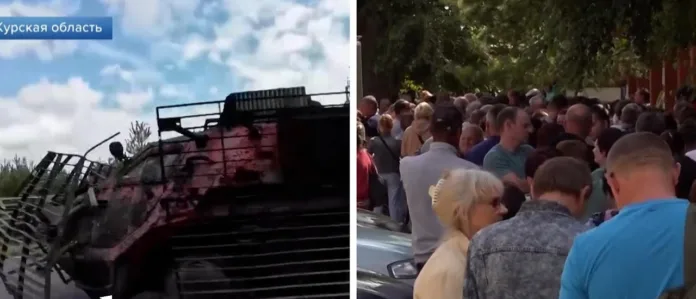Amid a surprise Ukrainian offensive, Russia is urgently hiring trench diggers and fortifying positions, while Ukraine consolidates control and continues its push in the Donbas region
In response to a surprise Ukrainian invasion, Russia is rapidly expanding its defensive efforts in the Kursk region. Reports indicate that Russia has posted urgent job advertisements seeking trench diggers, with wages reaching approximately $2,500 per month. The ads, found on the job site Avito, offer positions for labourers, excavator operators, and general workers, assuring that the work will be conducted “outside the combat zone” with minimal risk. The Institute for the Study of War has noted that Russia is hastily constructing defensive lines about 10 miles (16 kilometers) from the Ukrainian frontline in Kursk.
The United Nations Human Rights Office (UNHCR) has sought permission from Moscow to visit the affected Russian regions. Despite multiple requests for access to both Russian territory and Ukrainian regions under Russian control, these requests have been denied. In contrast, Ukraine has committed to opening humanitarian corridors and providing access to international humanitarian organizations, including the International Committee of the Red Cross and the UN. In Kursk, Agence France-Presse reported that approximately 500 evacuees from border areas were seen queuing for aid distributed by the Russian Red Cross.
In a strategic move, Ukraine has established a military commandant’s office in the occupied Kursk region. According to Col Gen Oleksandr Syrskyi, this office aims to maintain order and address the needs of the local population. Maj Gen Eduard Moskalyov will head this new office. Ukrainian President Volodymyr Zelenskiy announced that Ukrainian forces had gained full control over the Russian town of Sudzha, which had a prewar population of 5,000 and plays a role in transporting Russian gas to Europe.
The Ukrainian incursion has boosted domestic morale but also highlighted the challenges Ukraine faces in the central Donbas region. Russian forces have been making incremental gains, pushing towards the strategic town of Pokrovsk. Reports suggest that Russian troops have taken control of Ivanivka, located 16 kilometers (10 miles) from Pokrovsk, although this claim remains unverified by independent sources. Ukrainian officials have reported the most intense fighting in weeks near Pokrovsk.
In a significant development, Ukraine’s special forces captured over 100 Russian soldiers in Kursk, according to the Security Service of Ukraine (SBU). The captured troops were part of Russia’s 488th Guards Motorized Rifle Regiment and its “Akhmat” unit, making this the largest capture of Russian soldiers since the start of the full-scale invasion. The SBU revealed images of the soldiers, who were detained in a concrete bunker with their equipment. These prisoners are expected to be exchanged for Ukrainian POWs.
Meanwhile, a Russian Tu-22M3 strategic bomber crashed in the Irkutsk region of Siberia, resulting in the death of one crew member out of four, despite the survivors managing to eject. The regional governor, Igor Kobzev, attributed the crash to a technical malfunction, though this cause remains unconfirmed.
Analysis:
Political:
Russia’s urgent hiring for trench diggers and defensive construction in Kursk underscores the shifting dynamics of the war and highlights Russia’s desperation to bolster its defensive lines. The Kremlin’s focus on fortifying Kursk reveals the strategic importance of this region and its vulnerability to Ukrainian advances. The establishment of a Ukrainian commandant’s office in Kursk also signals Ukraine’s intent to consolidate control and manage the region effectively, reflecting its growing operational capabilities.
Social:
The Ukrainian incursion into Kursk and the subsequent hiring drive for trench diggers reflect broader social impacts of the ongoing conflict. The rapid mobilization for defensive work suggests an increased sense of urgency and fear among Russian citizens about the escalating threat. On the Ukrainian side, the establishment of humanitarian corridors and the provision of aid to evacuees highlight the government’s commitment to civilian welfare amid the conflict, influencing public perception and morale.
Racial:
The conflict’s racial implications are less direct but still present. The diverse backgrounds of soldiers and civilians affected by the war illustrate the broader international dimensions of the conflict. The capture of Russian soldiers from various units indicates the widespread impact of the war on personnel from different regions and ethnic backgrounds within Russia.
Gender:
Gender dynamics in the conflict are also notable, particularly regarding the roles of military personnel and civilians. The majority of front-line soldiers are male, while civilian impacts are felt across genders, including women and children in affected regions. The focus on defensive construction and military operations often overshadows the roles of women and families impacted by the war, though they are deeply affected by the conflict’s consequences.
Economic:
The economic implications of the war are evident in the significant investments required for defensive fortifications and military operations. Russia’s hiring of trench diggers and the associated wages reflect the economic burden of maintaining a prolonged conflict. For Ukraine, the costs of managing occupied territories, providing humanitarian aid, and sustaining military operations are substantial. The overall economic strain affects both nations, influencing their strategic decisions and international relations.
